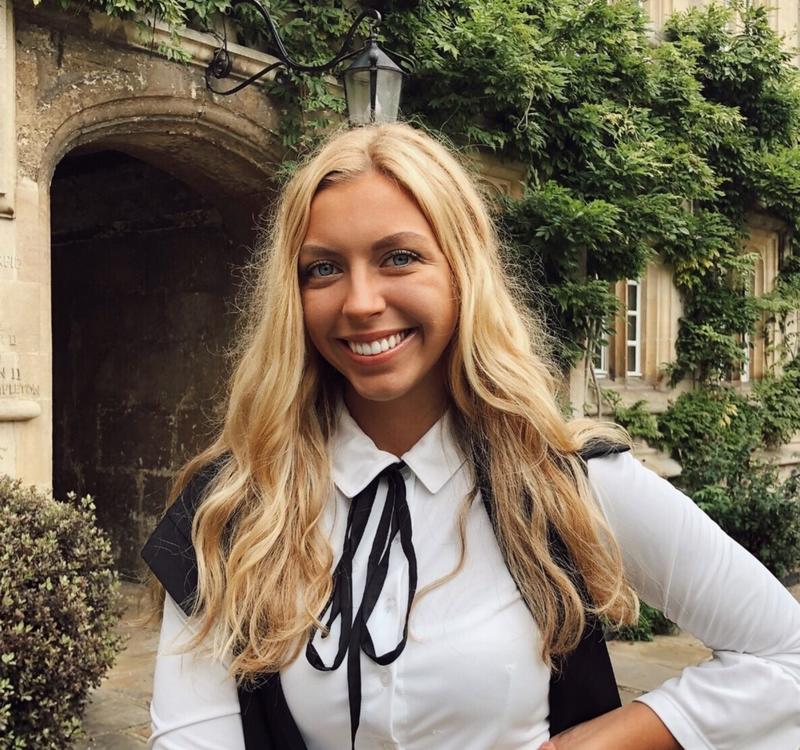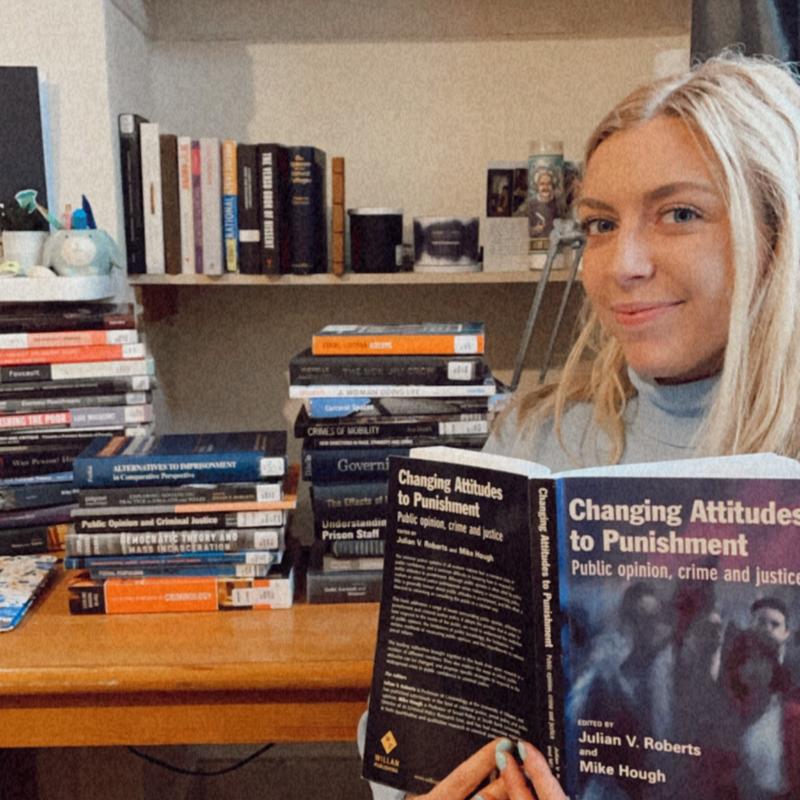DPhil Student Spotlight: Helen Kosc
DPhil Student Spotlight: Helen Kosc
After studying Sociology and Psychology at Queen’s University, Canada, Helen joined the Sociology Department and Wolfson College in 2021. She is supervised by Professor David Kirk.

Why Sociology?
For as long as I can remember, I have been fascinated by people and the way they interact.
Of all the unique and complex people I have met, I have always tried to understand the motivations behind their actions rather than judging them for the product of those actions. In no way is this truer than in my experience volunteering with those incarcerated in Canadian prisons.
Within a week of starting my undergrad degree at Queen’s University, I decided to complete training to receive my official Correctional Service Canada Volunteer ID that would allow me to volunteer in any prison or correctional facility across Canada.
Four years later, I had interacted with over 100 incarcerated individuals across five Canadian prisons, learning more from those personal experiences than I ever could have in textbook or lecture hall.
I had no idea when I first stepped foot into Millhaven Maximum Security Prison that my personal and academic goals would never be the same. The hundreds of individuals I met were living, breathing reminders of my vocation: to seek to understand. And I knew there is no better subject or discipline to pursue this than Sociology.
Where do your research interests lie?
Churchill (1910) once said: “The mood and temper of the public in regard to the treatment of criminals is one of the most unfailing tests of civilization of any country.” Citizenship has become an exclusive rather than inclusive topic, because those very same democratic structures that are meant to protect citizens from harm end up punishing the marginalised few – those with a criminal record.
With 48% of those individuals released from UK prisons being reconvicted of another offence within their first year of release and 75% within nine years of release (Ministry of Justice, 2022), the importance of investing in effective re-entry support programming cannot be overstated.
What advice would you give prospective students?
The best piece of advice I could give to prospective students would be that 'growth lies just beyond your comfort zone'.
I remember the butterflies in my stomach when I first set foot in a maximum-security prison at 18-years-old. With age and experience, I’ve learned never to shy away from that uncomfortable feeling but rather to chase it!
A lot can be missed when we choose the comfort of familiarity over the risk of exposing ourselves to new people, places and ideas in fear that they may challenge what we think we know to be true.
From learning about the Israeli-Palestinian conflict by studying it first-hand in Jerusalem for two months, to interning as a research assistant at the world’s top neuroscience laboratory at the University of Melbourne and Monash with no neuroscience background, to making time, even as a full-time student, to volunteer with Aspire Oxford, a local charity that offers prison re-entry support programming – my most informative experiences have always been those that lay beyond my comfort zone – immersing myself in settings and discourses that I am unfamiliar with and entering those experiences with an open mind.
I strongly believe the mark of a good academic is embracing discussions that challenge your perspective, worldview and opinions through respectful dialogue across difference.

What first attracted you to the course at Oxford?
Through my experience working with and volunteering for Correctional Services Canada, I learned that no amount of my time or resources that I devoted to preparing individuals for their release could prepare them for the structural impediments that they would inevitably face: homelessness, unemployment, the consequences of a criminal record, a system that seems stacked against them...
I knew I owed it to the 100+ people I met to do more, and this meant inspiring larger structural and systemic changes in the criminal justice system.
This is precisely what led me to the Sociology Department at Oxford – where renowned sociologists and criminologists have devoted their academic careers to the pursuit of exactly that.
I join them now as a Doctoral candidate whose research examines the structural support available upon release to those formerly incarcerated individuals through a case study of individuals released in the Thames Valley region of the UK.
What have you enjoyed most about being a student at Oxford's Sociology Department?
The Sociology Department grants students access to a network of incredible academics pursuing ground-breaking research across a diverse range of topics.
A lot of the faculty and researchers conduct interdisciplinary work, meaning you gain access to experts beyond the Department.
The Department also offers a number of opportunities to be involved in research projects beyond your own.
In March 2021, I began working with Dr. Marti Rovira, investigating the effects of a criminal record on employability and discriminative hiring through the first-ever experimental audit research design of its size and scope in the UK.
I was responsible for data collection, storage and subsequent analysis – gaining invaluable experience developing and applying the audit method for field experimental research design.
My experiences on that project allowed me to assist on a similar experimental audit design for Prof. David Kirk’s project, exploring whether former police officers in the US face stigma in the labour market following the social unrest from lethal police violence.
What do you enjoy most about living in Oxford?
Probably the libraries! I spend almost everyday during term time in one of Oxford’s many historic libraries. In fact, I’m slowly working my way through all of the University’s libraries (there are over 100!).
My favourites are Lincoln College library for its beauty, All Souls College library for its quiet atmosphere, and the Law Library since it contains all the books and resources that are relevant to my research.
What do you hope to do when you finish your course?
While there is no telling what the future might hold, I have three goals that I hope guide me after I complete my course:
First, I hope to return to my roots and rejoin Correctional Services Canada. I hope to return to serving the same communities of individuals who inspired me to study prison re-entry at Oxford in the first place and hope I can use all that I have learned to improve their re-entry experiences.
Second, it is a goal of mine to co-author work with those presently incarcerated in prison. I hope to set a precedent in academic literature that we have as much to learn from our community as we do to offer them. By co-authoring with someone who has lived life experience, I hope to democratise knowledge beyond the realm of academia.
Third, I hope to stay connected with the Sociology Department and the University of Oxford community. Whether this be as a visiting academic or a potential faculty position one day, I hope to remain part of this incredible network of academics who will undoubtedly make a difference in their communities and will continue to motivate me to do the same.
You can get in contact with Helen here.




